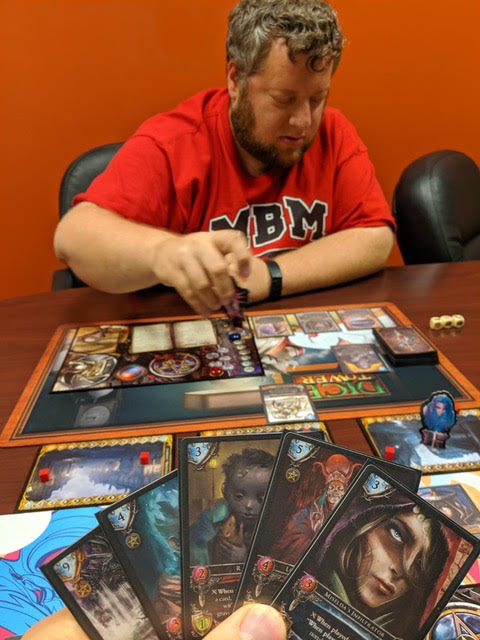17 Jul Sorcerer Review – Two-Player Games and Sorcerer
As an avid board gamer, keeping a solid gaming group around can be pivotal to getting the new, great games to the table. For the most part, many of the bigger, more exciting games are best played with three or four players. Coming up with this number has been pretty easy throughout my time involved in the board game hobby until recently. After the local game shop closing, friends having babies and getting new jobs, and just other life events in general, it has been difficult to find time to meet with a regular gaming group. Still having the desire to game however, I have come up with my own creative solution: bring out the two-player games. After all, my gaming group is still around. Their time has just been dispersed in a million different directions.
Finding time to play a game or two on a random night with one other person during the week is by far an easier task than finding a night that works for everyone, and following this methodology has led to multiple opportunities to pull out games I haven’t been able to play as much on those regular gaming nights we used to hold. Just in the past few weeks I have been able to play multiple games of Summoner Wars, Sorcerer, Master of Wills, and even pull out some old Magic the Gathering decks. This process has provided me with a chance to rekindle my love for two-player games.
 As I continue to play more games and reflect on my experiences in gaming, I have found games that are exclusively two-player or have the option to play at two players offer a tighter feeling than what is found in most games for three or four players. Each player is able to analyze what the other player is doing and can easily manage the calculations that often define a more cutthroat experience. The amount of randomness diminishes, as players are able to make more educated decisions about what it is they are planning to do with each play. Tone becomes everything. Every move a player makes has implications not only on what they are doing, but also on what their opponent is scheming up. This slow-building tension is seen maybe most vividly through White Wizard Games’ new card game, Sorcerer.
As I continue to play more games and reflect on my experiences in gaming, I have found games that are exclusively two-player or have the option to play at two players offer a tighter feeling than what is found in most games for three or four players. Each player is able to analyze what the other player is doing and can easily manage the calculations that often define a more cutthroat experience. The amount of randomness diminishes, as players are able to make more educated decisions about what it is they are planning to do with each play. Tone becomes everything. Every move a player makes has implications not only on what they are doing, but also on what their opponent is scheming up. This slow-building tension is seen maybe most vividly through White Wizard Games’ new card game, Sorcerer.
In Sorcerer, players go back and forth, spending one action at a time until both players have completed six actions. Following these actions is a combat phase where players are struggling for control of specific locations across London. Given the immediacy of combat following the action steps, each action seems like making a choice that could have grave implications for the upcoming combat step. This tension continues to build as each player gets closer to their final action. Then, with the sixth and final action, players often choose to do something that completely changes what the combat phase will look like. It’s like there is a balloon filling with suspense for the first five actions, and then all of a sudden, out of nowhere, a pin is slammed into the balloon, creating a magnificent explosion, distorting all of your inhibitions and shifting all of your expectations. And this happens every round!
 This is possible because of how far-ranging the available actions are. For some, you simply draw two cards or gain two energy (the resource used to play cards). These I consider to be more passive actions while other, more active actions include summoning powerful monsters to locations to join the battle and moving monsters in play from one area of the city to another. Neither player wants their opponent to have enough time to react to the major power plays that take place, so each player tends to start each round with a more passive action—often drawing cards to have more options in the following turns and, at times, continuing to save up energy. Let me tell you, nothing is scarier than seeing someone continually choosing to save their energy. Are they going to play something massive? Are they going to play three cards consecutively that are going to foil my plan? You just don’t know, and whatever your opponent chooses, it will surely be unexpected. For that reason alone, Sorcerer will be hitting my table a lot more this summer.
This is possible because of how far-ranging the available actions are. For some, you simply draw two cards or gain two energy (the resource used to play cards). These I consider to be more passive actions while other, more active actions include summoning powerful monsters to locations to join the battle and moving monsters in play from one area of the city to another. Neither player wants their opponent to have enough time to react to the major power plays that take place, so each player tends to start each round with a more passive action—often drawing cards to have more options in the following turns and, at times, continuing to save up energy. Let me tell you, nothing is scarier than seeing someone continually choosing to save their energy. Are they going to play something massive? Are they going to play three cards consecutively that are going to foil my plan? You just don’t know, and whatever your opponent chooses, it will surely be unexpected. For that reason alone, Sorcerer will be hitting my table a lot more this summer.
I simply love the interaction it creates between players. Board games often tell stories, and two-player games, like Sorcerer, often focus on suspense, tension, and a healthy dose of contemplation. I find myself sitting at the edge of my chair trying to guess how my opponent will react and how they will hinder my plan or burst my bubble. Decisions slowly become more and more calculated as I determine when I am going to pounce. As much as I love playing three- and four-player games, the tight gameplay found in two-player games is something that should never be overlooked. Their stories are often unique, providing “a-ha” or “gotcha” moments throughout. These games create memories that are completely distinct from other gaming scenarios and, because of that, I love two-player games.
Thanks for reading and keep on gaming,
Matt Pioch
Matt has been participating in the hobby board game community since 2012. He has been an avid consumer of board game media content (podcasts, blogs, vlogs, etc.) for the last 7 years and has finally come on to the scene to produce some original content through Inside Up Games in the form of a blog. Interact with Matt on BGG, Instagram or Twitter.



Sorry, the comment form is closed at this time.